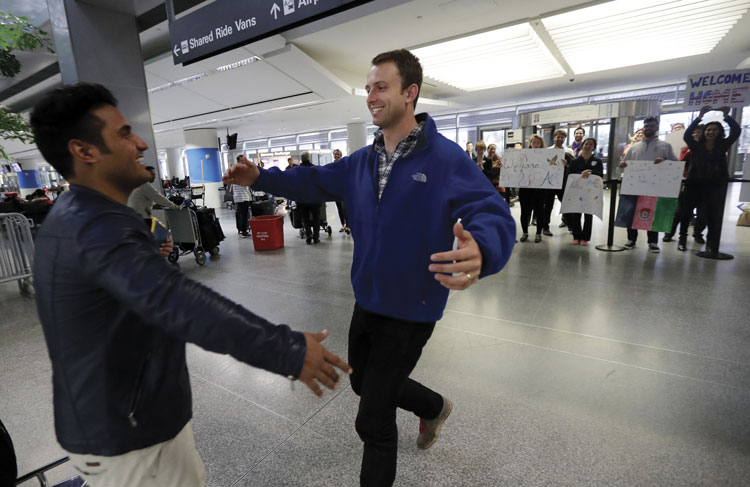Afghan and Iraqi interpreters for the US are caught in a deadly immigration waiting game

In February, former Army Capt. Matthew Ball (right)—now a law student—welcomed Amin at San Francisco International Airport. Photo by AP Photo/Marcio Jose Sanchez
But the bulk of applications from all of these programs are stuck in administrative processing. When creating the two temporary SIV programs, Congress required the departments of State and Homeland Security to report on them quarterly. Numbers from the most recent reports, issued in April, show that 95.9 percent of Iraqis and 31 percent of Afghans with pending SIV ap-plications were in administrative processing. For both nationalities, administrative processing took up a third to half of the time, which averaged just under 200 days in each program.
Fisher says while these are security checks, it’s not clear what exactly is being done—or which agencies are doing it. For security reasons, the federal government doesn’t publicly disclose specifics, even to applicants. But there are a lot of checks, she says, and they all have to agree. That can cause problems.
“Sometimes one person will be approved by various agencies, but then another agency will be on hold, whether it’s because they are working on other things that week or because they have access to a different database, and they’re looking into it,” she says. “So it takes a lot of time to get everybody on the same page.”
That can lead to another problem, she says, where one agency takes so long that a prior step in the process expires.
“If one person’s medical checks are approved, but then the security checks take a long time ... you might have to start the process over,” she says. “So you can have kind of cyclical delays in some cases.”
Ball, the Stanford Law student, adds that government officials have told him a common name could also be an issue.
“It could be something as simple as there could be somebody else named Qismat Amin who popped up on a list somewhere, and they have to do due diligence,” he says.
Scott Cooper, director of national security outreach for Human Rights First, adds that bureaucratic mistakes also happen. Through his group’s Veterans for American Ideals project, which advocates for the SIV program, Cooper learned the story of an Afghan interpreter named Zia. Zia had to quit working for the U.S. when he got death threats from the Taliban, so he applied to the SIV program. He and his family waited more than three years, during which time he tried to keep a low profile while driving a taxi in Kabul.
But when the visas finally arrived, there were only five visas for his six children. His advocates had to get help from Congress in order to fix what looked like a simple mistake. Thanks to that intervention—and a crowdfunding campaign by Marines who’d worked with him that paid for their plane tickets—the entire family is now living in Oregon.
Cooper, who spent 20 years in the U.S. Marine Corps and retired as a lieutenant colonel, stresses that security checks are extremely important. But they can raise false red flags when applicants are asked whether they’ve ever had contact with extremist groups.
“If someone had to pay a toll because they were going through a Taliban checkpoint, then they will report that,” says Cooper, who served five tours in Iraq and two in Afghanistan. “That in turn, requires a waiver for them to be able to be granted refugee status, because by paying the toll, the implication is that they were supporting al-Qaida, the Taliban or the like.”
Advocates note that this security measure is on top of the thorough checks that Afghan and Iraqi nationals must go through before they’re hired by the United States to begin with. Amin says he passed a security interview with the Army and produced a document from local police, showing he had not been convicted of any crimes.
And even aside from all of that security vetting, Cooper notes that the SIV process requires applicants to bring the federal government a lot of documentation about who they are. That includes a letter of recommendation from their direct supervisor, approval from the head of the organization that employed them, the background check and screening from the hiring process, passport biodata, birth certificates, fingerprints and medical results.
And ultimately, Ball says, “there is no better vetting than spending years fighting the Taliban alongside Americans.”

BROTHERS-IN-ARMS: Ball and Amin worked together in the Shinwari district of Afghanistan, and now the interpreter is living with Ball and his wife in the Bay Area. Once he receives his green card, Amin hopes to pursue a master’s to further his undergraduate degree in business. Photo by Tony Avelar.
Reform Efforts
Despite these problems, advocates say the process has actually improved. In 2013, media reports about slow SIV processing and seemingly arbitrary denials started appearing. According to data from the State Department, a total of 5,848 out of 27,000 visas, or 22 percent, had been issued in the Iraqi program in the fiscal years 2008 through 2013; and only 987 out of 7,500 visas, or 13 percent, had been issued in the Afghan program in the fiscal years 2009 through 2013.
The dismal statistics and negative publicity helped create a push to speed up processing times. At an April 2013 hearing of the Senate Committee on Foreign Relations, Sen. Jeanne Shaheen, a Democrat from New Hampshire, cited the New York Times when asking then-Secretary of State John Kerry about the backlog for Afghan applicants. Later that year, Congress put some reforms of the SIV programs into the National Defense Authorization Act—the bill that provides national military funding—for fiscal year 2014. The bill required processing in the two temporary programs to finish within nine months, except in high-risk cases. It also required quarterly public reports on visa processing times.
“Secretary Kerry, starting in 2014, made a conscious effort to say, ‘We’re going to get this fixed; we’re going to put more manpower and resources behind it,’ ” says Cooper.
Things did improve—but Cooper says it didn’t last. The first quarterly reports, issued in April 2014, said total processing times were down to 239 calendar days for Iraqis and 287 for Afghans, excluding steps that were the applicant’s responsibility. But over the next two years, processing times gradually increased. As of April, the average processing time was still 305 calendar days for Iraqis and 480 for Afghans.
“It’s a 14-step process, and the delays, quite honestly, are a lack of ability to get them processed,” says Cooper. “And I don’t want to be unnecessarily critical of the State Department, but they’ve been slow.”
So slow, in fact, that IRAP filed a lawsuit, Nine Iraqi Allies v. Kerry, in February 2015. One plaintiff, called Mr. Alpha in court papers, was injured along with his son when militants burned down their house with them inside. The militants then found the family’s new home and threatened them, so they fled to Amman, Jordan.
Even there, the threats continued, requiring Alpha to change his home and car. When the lawsuit was filed, his application had been pending more than five years.
“Congress clearly stated that the whole process for applications should take nine months, and it’s never taken within that nine-month period” on average, Fisher says. “So we weren’t challenging the security checks, but were challenging on behalf of clients who had been waiting in some cases five years for a visa.”
That lawsuit was ultimately settled out of court, but not before a public ruling on the government’s motion to dismiss. The district court in Washington, D.C., found that under the Administrative Procedures Act, agencies must take action on applications within a reasonable amount of time. Though the 2014 NDAA did include an exception to the nine-month time limit for high-risk cases, the court said, Congress could not have intended that to apply to all cases. Otherwise, the exception would “swallow the nine-month rule in its entirety.”
Correction
Print and initial online versions of “Forgotten Allies, Broken Promises,” September, should have stated that Afghans may apply for special immigrant visas even after all available SIVs have been awarded, but the State Department will not schedule interviews until more become available. It also should have reported that President Donald Trump's executive order blocks Iraqi nationals from entering the United States as refugees.The Journal regrets the errors.
This article was first published in the September 2017 ABA Journal magazine with the headline "Forgotten Allies, Broken Promises."



